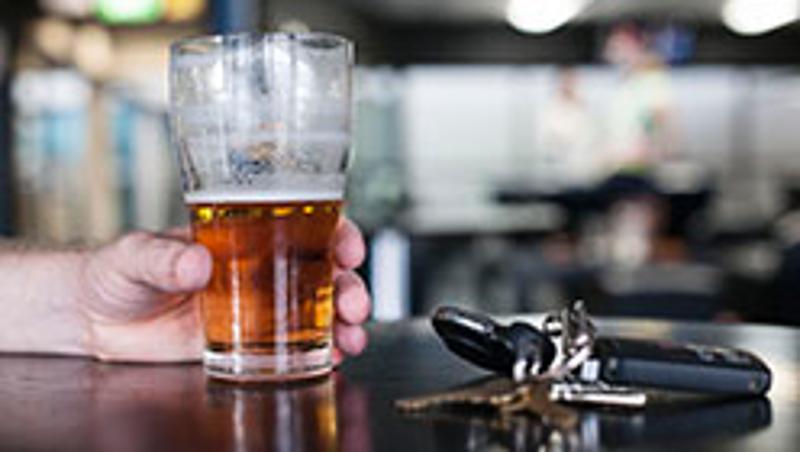
Changes to China's drink driving laws are catching the community off guard with more than 70 per cent of people unaware of the blood alcohol limits that could see them face criminal charges, according to new Queensland University of Technology (QUT) research conducted in two Chinese cities.
QUT's Centre for Accident Research & Road Safety - Queensland (CARRS-Q) has partnered with organisations in China to promote road safety and reduce fatalities and injuries, as alcohol-related driving offences are being brought into sharper focus because of the country's rapid motorisation and entrenched alcohol culture.
CARRS-Q doctoral student Keqin Jia, who grew up in China and is now an Australian citizen, said alcohol was a major contributor to road crashes in China and in May 2011 the government amended legislation to criminalise offences against the higher of its two legal blood alcohol concentration limits for drivers.
"The amendments mean a driver caught with a blood alcohol level greater than 0.08 per cent is charged with driving while intoxicated, translated as "drunk driving", which is now a criminal offence," he said.
"Drivers with a blood alcohol level greater than 0.02 per cent and up to 0.08 per cent are charged with driving under the influence, translated as "drink driving", as before."
Mr Jia said since the new regulations were introduced there had been a drop in alcohol-related crashes, but there was concern around the limited awareness of the new limits and how that might be contributing to offending rates.
"What our studies found is that general drivers and convicted drunk drivers showed low levels of knowledge about the legal limits for drink driving and drunk driving offences," he said.
"Only 20 to 30 per cent of drivers nominated the correct legal limits for drink and drunk driving and convicted drunk drivers were only slightly more aware with between 20 and 40 per cent knowing the limits, despite having been prosecuted for their offence."
Mr Jia said one of the challenges for China was the lack of definition of what constituted a standard drink.
"The problem in China, compared to Australia, is that they have a wide availability of alcohol with a variety of alcohol concentrations, so it is difficult to define a standard drink.
"In Australia, road safety campaigners have been pushing for drinks to display labels advising of how many standard drinks are in a bottle, but there is nothing similar in China.
"Therefore there is very limited knowledge of the amount of alcohol that can be consumed while staying under the legal limit to drive.
"Our studies found that less than 10 per cent of drivers and convicted drunk drivers could say how many drinks they could consume and stay under the legal limit to drive.
"For beer and spirits, the results were even lower with only 2 per cent of convicted drunk drivers able to determine how many drinks were too many drinks to drive."
CARRS-Q is one of the leading road safety centres in Australia and is a vital player in the international pursuit of road safety.
Senior academic Dr Mark King said CARRS-Q was committed to helping build research capacity in rapidly motorised countries including China.
"Ninety per cent of road fatalities occur in low and middle income countries and CARRS-Q is committed to building capacity in these countries in the areas of research and intervention," Dr King said.
"This involvement includes funding PhD research into alcohol-related offences in China, as well as supporting research fellowships which have seen QUT researchers work and live in the country.
"QUT will continue to work with countries like China and support their research and intervention efforts aimed at addressing the enormous human, economic and social costs resulting from road crashes."
Other academics who have contributed to this research include Dr Judy Fleiter and Professor Mary Sheehan.
Mr Jia's research has been published in conference proceedings and journal articles are forthcoming or under review.
Jia, K., Fleiter, J., King, M., Sheehan, M., Ma, W. and Zhang, J. (Forthcoming). Knowledge and behaviours of drunk driving offenders in Guangzhou, China. International Journal of Alcohol & Drug Research.
Jia, K., King, M., Sheehan, M., Fleiter, J., Ma, W., Lei, J. and Zhang, J. (2013). Baseline study of alcohol dependence among general drivers and drink drivers in Guangzhou, China. Proceedings of RSRPE2013, Road Safety Research, Policing and Education Conference, 28-30 August 2013, Brisbane, Australia.
Jia, K., Fleiter, J.J., King, M.J., Sheehan, M., Dunne, M. and Ma, W. (2013). Reducing alcohol-related driving on China's roads: Traffic police officers' perceptions and practice. Proceedings of RS4C 2013 (Road Safety on Four Continents, 16th International Conference), Beijing, China, 15-17 May 2013.
RELATED STORIES
Big-data project gives birds-eye view of the G20
QUT G20 contacts for media
Team Memorial secure G20 Global Business Challenge prize
Media contact:
Sandra Hutchinson, QUT Media (Tue, Wed), 07 3138 9449 or media@qut.edu.au
After hours, Rose Trapnell, 0407 585 901




